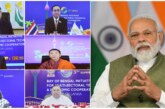#ReengineeringWaterGovernanceinIndia
#Watergovernance has been defined by the #GlobalWaterPartnership (#GWP) as “the range of political, #social, #economic and #administrativesystems that are in place to develop and manage #waterresources, and the delivery of #waterservices, at different levels of society”. This definition has been adopted by many other agencies, including the #WorldBank and #UNDP, with slide modifications.
Viewed in a broad spectrum, #watergovernance is the set of systems that control decision-making with regard to #waterresources #development and #management. It is, therefore, more about the way in which decisions are made (i.e. how, by whom and under what conditions) than about the decisions themselves. It entails the manner in which roles and responsibilities, including design, regulation and implementation etc., are exercised in the #managementofwater and broadly encompasses the formal and informal institutions by which authority is exercised.
Many experts have increasingly recognized that the so-called ‘#watercrisis’ is primarily a crisis of governance. This becomes discernible in water services in the form of prevalent fragmented institutional structures, the lack of clarity of roles and responsibilities, questionable resource allocation, patchy financial management, low capacity of implementing organisations; and in the pervasive leakage of sector resources, weak accountability mechanism for, policy-makers and implementing agencies, ill-defined or non-existent regulatory #environments, and unpredictability in the investment climate for private sector actors etc.
Broadly speaking, bulk of these problems is rooted in a general #lackofknowledge and #awareness of rights and responsibilities of the #stakeholders in #watersector. Accordingly, water often trails other basic services in getting on the #poverty reduction agenda, even though it is predominantly the poor that lack access, and in addressing concerns surrounding equity and pro-poor service provision.
[Most of the experts are unanimous in their opinion that the water sector has traditionally been and still is, to a great extent, driven by investments in #technologicalinnovations and #developmentofinfrastructure to increase #watersupply. Undoubtedly, such a scenario has permitted a large number of people to benefit more in terms of access to water; nevertheless there have also been many instances where infrastructure did not operate in an effective manner, or where the benefits of appropriate technology were not fully realized.]
The resultant outcome of such a scenario has given rise to a new set of questions in #developmentcircles, which inter alia include: Who is making decisions on the right to water and its benefits? Who is making decisions about who gets what #water, when and how? What voices are heard in influencing decision-making? And on what political and scientific basis are decisions made?
Undoubtedly, the tone and tenor of governing water affairs wields profound impacts on #livelihoods of the people in a given society, yet #governance has not received the same attention, within the water sector, as technical and #infrastructuredevelopments have. Any water governance mechanism, apart from allocating water to ensure #food and #watersecurity, should also be able to appraise as to for whom and for what purposes water is provided.
In fact, there is a need for making tough trade-offs and allocation of benefits and costs have to be clarified. #Governance is fundamentally about such processes of making choices, decisions and trade-offs. Significantly, the development of water governance systems and that of #watertechnology and #infrastructure are closely intertwined to one another. The effective application of technology and the proper functioning of infrastructure require an enabling #governancesystem.
#WaterGovernanceinIndia
Keeping in view the finite water resources, which are already under stress, demand for water in India has already exceeded the available supply capability thereby giving rise to water crisis. Given the fact that India’s climate is not particularly dry, nor is it lacking in rivers and #groundwater, the #watercrisis in India is predominantly a man made problem. Exceedingly poor management, unclear laws, malpractices, and industrial and human waste have caused this #watersupply crunch and rendered what water is available practically useless due to the huge quantity of #pollution. There is a need for balancing competing demands between urban and rural, rich and poor, the #economy and the #environment.
Viewed in broad perspective, context of #water, society and #environment in India is unique, diverse, complex and there is very little similarity with respect to any other country in the world. The intensity and complexity of water related challenges in India is registering manifold increase. Increasing pace of #urbanization, #industrialization, growing menace of pollution of surface and #groundwaterresources, augmentation in per capita demands, wasteful, and luxury consumption etc., all adding stress on #waterresources. Adverse impact of #climatechange will further worsen the #watersituation.
Prevalence of multiple agencies in water sector in India is a deterrent to #goodgovernance and it will take time to rationalize these agencies. Broadly speaking, presence of these multiple agencies is not the problem; the problems pertain to their mode of thinking in exclusive and non-interacting silos and lack of coordination between them in a transparent, participatory way. The over-emphasis on technology and #infrastructure leads to neglect of basic issues having bearing on governance.
Initiatives for Reform
Promotion of good governance in water sector in India has been a neglected field thus far. Water, being a State Subject, under the Indian Constitution has seldom found any taker for initiating reforms. Fundamental reforms are yet to be attempted in water sector in India. However, it is debatable as to what is fundamental or top priority, but the real question is how it is going to happen.
A cursory look at the history of functioning of #MinistryofWaterResources (#MoWR), #CentralWaterCommission (#CWC) and other #waterestablishmentinstitutes, reveals that there seems absolutely no effort at any fundamental reform, not even an effort to learn from the past experience.
Bureaucratic grip over #waterinstitutions, both at the Centre and the States, seldom facilitates achievement of bottom up governance that can also allow breathing and growing space for innovations. Besides, there is acute absence of independent think tanks critically analysing governance and taking firm, unambiguous positions.
In the wake of such a sordid state of affairs afflicting water sector in India, a non-profit civil society named #IndiaWaterFoundation has played a key role in attracting the attention of the #MinistryofWaterResources and other ministries to address #waterrelatedissues through promotion of notions like #convergence, #publicpublicpartnership, #capacitybuilding of the stakeholders and emphasis on #nexus approach etc.
The subject of #water is being looked after by more than 10 ministries of the Government of India and by the respective states as water being a state subject. This results in replication of work and extra burden on exchequer without much tangible outcome. #IndiaWaterFoundation has been emphasizing on convergence between and amongst various departments and ministries of the Government of India dealing with #water. The IWF has been instrumental in initiating inter-sectoral convergence in the two official level meetings held in #VigyanBhawan on water-related issues in 30 April 2009 between and among the #MinistryofWaterResources, #MinistryofRuralDevelopment, #MinistryofEnvironment, #MinistryofAgriculture, #MinistryofHealth and some other ministries of the #GovernmentofIndia.
The IWF has also made endeavours for Centre-State convergence in water sector, especially between the Ministry of Water Resources, Government of India and state governments of Uttarakhand and Meghalaya. The #IWF has entered into MoU with the #GovernmentofMeghalaya to cooperate in the management of #waterresources in #Meghalaya. A mode of synergy between #MinistryofWaterResources and #MinistryofEarthSciences is on the anvil owing primarily to the initiative taken by the #IWF.
#Water is a primary catalyst for #sustainabledevelopment and as such #water-#energy-#food #nexusapproach constitutes an integral part of introducing good governance in water sector. Keeping in view the close nexus between water, energy and food, solution to water related problems can better be facilitated through this ‘#nexusapproach’, which seeks to find solutions based on convergence between various sectors or disciplines and is being widely regarded along with resilience to attain #sustainabledevelopment. The nexus approach, as a part of #watergovernance, can serve as a bridge that could engulf the gap between the social, economic and environmental pillars of sustainable development.
[#Goodgovernance in #watersector entails equal emphasis on ‘#SoftApproach’ along with emphasis on #technology and #infrastructure for water. The #IWF has taken up this initiative by writing to various ministries in this regard. The #SoftApproach entails #capacitybuilding of the people and as such #IndiaWaterFoundation is affirmative about the need for #capacitybuilding of the people and institutions in #watersector. This task of #capacitybuilding of the people can be accomplished by #sensitizing, #incentivizing and #galvanizing the people about #waterrelatedissues.]
In order to make water governance more effective, there is a need for paradigm shift from #sectoralapproach to #collectiveapproach in tackling water related problems. Various #national and #international agencies dealing in water look upon water from their regional or problem-centric perspective. Nevertheless, water is a national issue that calls for collective approach and not sectoral approach. #IndiaWaterFoundation lays emphasis on inter-nation and inter and intra-organizational synergy in water sector to ensure sustainable supply of safe drinking water globally.
The Regional Workshop on #WaterQualityMonitoringintheAsiaPacific region organized by #IndiaWaterFoundation in collaboration with #UNEPGEMS #Water Programme at New Delhi on 5-8 November 2012 signaled a right perspective in this direction.
Conclusion
There is dire need for making policy-decision-making process and its #implementation more democratic, accountable and transparent with increased role for the people, communities and civil society. The basic water data and basic documents pertaining to public purpose projects should be made accessible to the people. There should be credible performance appraisals from time to time. The notion of #NationalWaterHub as a nodal agency to deal with water related issues from #Panchayat level to the level of central ministries by #networking and #dissemination of the data/information, technological advancements, knowledge, #bestpractices/#successstories in the water sector to all #stakeholders, as has been suggested by the #IWF to the Government of India, should be given a concrete shape now. This will be an appropriate step in the right direction of envisaging #goodgovernanceinwatersector.
Besides, this will help in averting awkward situations as happened recently in #NOIDA where real estate builders were denied access to #groundwater. #Goodgovernance in water sector based on #synergy, #intersectoralconvergence and #capacitybuilding of the #stakeholders will prove instrumental in mitigating #waterwoes and ensure #sustainablesupplyofwater.
By #DrArvindKumarPresidentIndiaWaterFoundation



